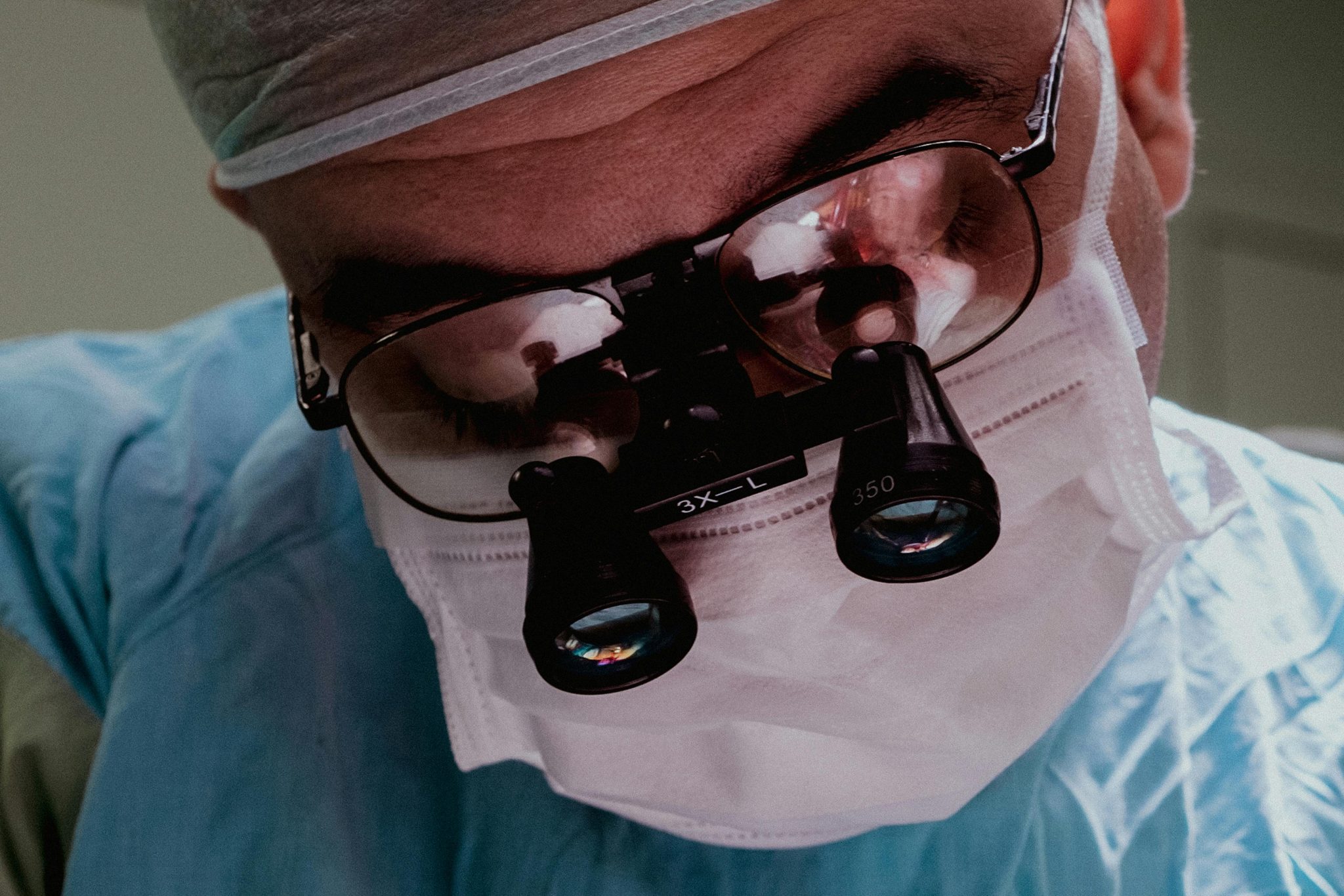You’ve been thinking about getting rid of glasses or a contact lens for good. Maybe you’ve heard that LASIK surgery isn’t the right fit for you. So, you started looking into other options and came across Implantable Collamer Lenses, or ICL surgery. It sounds promising, but now you’re facing a big question: who do you trust to perform the procedure? This brings you to the critical crossroad of an ICL surgeon vs general surgeon. It’s a decision that feels heavy because it’s about your vision, one of your most precious senses.
It’s completely normal to feel a little overwhelmed by this choice. You want the best possible outcome, and that starts with the right doctor. The debate of an ICL surgeon vs general surgeon isn’t just about credentials; it’s about specialized skill and dedicated focus. This decision will directly impact your surgical experience, your safety, and the clarity of your vision for years to come.
The Core Difference: Specialization Isn’t Just a Title
First, let’s break down what a general eye surgeon, or ophthalmologist, does. They are incredibly skilled doctors who diagnose and treat a wide variety of eye conditions. Their day might involve managing glaucoma, performing cataract surgery, or treating eye injuries. They have a broad base of knowledge covering the entire landscape of eye health.
An ICL surgeon is also an ophthalmologist, but they have gone a step further. They have chosen to dedicate a significant portion of their practice to one highly advanced procedure. They have invested extra time in training specifically for implanting collamer lenses, also known as a phakic intraocular lens. This focus allows them to build a deep well of experience that a generalist simply cannot match when it comes to ICL surgeries.
Think about it this way. If you needed a complex heart valve replacement, you wouldn’t go to a general practitioner. You would seek out a cardiothoracic surgeon who performs that exact operation multiple times a week. The same logic applies to your eyes and achieving clearer vision.
Training and Experience: Why Repetition Creates Mastery

ICL eye surgery is a delicate art. It involves making a tiny incision and placing a flexible, microscopic lens inside the eye, right behind the iris. It requires a specific set of manual skills and an intimate understanding of the eye’s internal structures. This isn’t something a surgeon can master by doing it just a few times a year.
A surgeon who specializes in ICL performs this procedure consistently. This repetition builds a level of muscle memory and intuition that is vital for this type of vision correction surgery. They’ve seen a vast range of eye shapes and sizes, and they know how to handle the subtle variations that each patient presents. They are comfortable and efficient, which means less time for your eye to be open during the correction surgery, often leading to a quicker recovery time.
Studies have consistently shown that surgical outcomes improve with the surgeon’s experience. According to research from the American Academy of Ophthalmology, higher surgical volume is frequently linked to lower complication rates. A general eye surgeon might be excellent at many things, but they likely don’t have the ICL-specific volume to build this same level of refined expertise. This is a key point in the ICL surgeon vs general surgeon comparison.
The Specific Learning Curve of ICL
Learning how to perform an implantable contact lens surgery isn’t a one-day course. It involves a process of certification and mentorship. A surgeon needs to perform a certain number of procedures under supervision before they can be considered proficient.
An ICL specialist has not only completed this but has gone far beyond it. They have moved past basic competency and into the territory of mastery. They have refined their technique over hundreds, or even thousands, of procedures. This experience means they are better prepared for any unexpected challenges that might arise during the operation.
Their deep experience helps them make tiny adjustments on the fly that can make a big difference in the final outcome. A surgeon with less ICL experience might follow a textbook procedure perfectly but lack the intuition to adapt when needed. It’s this subtle difference that sets a specialist apart when you are looking to improve vision.
The Crucial Candidacy Assessment
Determining if you are a good candidate for the EVO ICL is one of the most important steps in the process. This is where a specialist truly shines. A general ophthalmologist might conduct a standard eye exam and decide based on your eye prescription, but an ICL specialist goes much, much deeper.
They use advanced diagnostic equipment to take precise measurements of your eye during a comprehensive eye exam. They will measure the depth of the anterior chamber, the space where the lens will sit. According to the FDA’s approval information for the implantable collamer lens, having sufficient anterior chamber depth is a critical safety requirement.
A specialist will also look for factors that could make ICL surgery isn’t the best option, such as pre-existing severe dry eye or other conditions. They will also check the health of your corneal endothelium, the layer of cells that keeps your cornea clear. A specialist knows exactly what to look for to confirm the surgery is safe for you, identifying subtle issues that a generalist might overlook.
Seeing Beyond the Obvious
Sometimes, a patient might have been told they are not a candidate for any vision correction surgery. For example, if you have high prescriptions for nearsightedness or corneas that are too thin for LASIK laser eye surgery, a general surgeon might tell you there are no options left. This can be a common and discouraging scenario for those with significant refractive errors.
But an ICL specialist might see a different picture. Because they have extensive experience with this specific technology, they know its capabilities inside and out. They understand how to treat refractive errors even in complex cases. They may find that you are, in fact, a perfect candidate to correct nearsightedness with an ICL, opening up possibilities that might have otherwise been missed.
Mastery of Advanced ICL Technology
The technology behind the implantable collamer lens is always improving. New ICL lens models are released with better designs and materials that offer UV protection. A general eye surgeon who only occasionally performs ICL surgery may not be up-to-date with these latest advancements. They might only be comfortable with an older lens model they learned to use years ago.
An ICL specialist, however, is typically at the forefront of this technology. They actively stay informed about new lens options and surgical tools. This commitment means you get the benefit of the best available technology for your eyes, not just what’s convenient for the surgeon.
A Lens That Is Just for You
Choosing the right size and power for the implanted eye lens is not simple. It’s a complex calculation based on many different measurements of your eye’s natural anatomy. An error of just a fraction of a millimeter can affect the quality of your distance vision and night vision.
An ICL surgeon uses sophisticated software and their extensive experience to select the perfect ICL lens for you from various ICL lens models. They understand the nuances of how a phakic intraocular lens will behave inside a specific eye. This detailed approach is critical for achieving that crisp, clear vision you’re hoping for and reducing the risk of side effects.
ICL Surgeon vs General Surgeon: Comparing Approaches
The skills needed for surgery ICL are different from those used in other common types of laser eye surgery like LASIK or even cataract removal. LASIK permanently reshapes the cornea on the surface of the eye using a laser. Cataract surgery involves a lens replacement where the cloudy natural lens is removed and replaced with an artificial intraocular lens.
The ICL procedure, however, involves working in the tight space between the iris and the natural lens without any lens removed. It requires incredible finesse and a steady hand. An ICL surgeon has honed these specific skills through constant practice, whereas a general surgeon’s skills may be more geared toward laser surgery or an ICL cataract procedure.
A specialist’s movements are more precise and the margin for error is extremely small. You want a surgeon who is not just capable, but completely comfortable and confident in that environment. This confidence comes from one thing: dedicated experience with implantable contact lenses.
| Feature | ICL Specialist | General Eye Surgeon |
|---|---|---|
| Focus | Primarily on ICL and other refractive surgeries. | Treats a broad range of eye diseases and conditions. |
| Experience | Performs hundreds or thousands of ICL surgeries. | Performs ICL surgery infrequently. |
| Technology | Uses the latest ICL lens models and diagnostic tools. | May use older, more familiar technology. |
| Candidacy Assessment | In-depth analysis for ICL-specific requirements. | General eye exam, may not catch subtle contraindications. |
| Handling Complications | Extensive experience in managing ICL-related issues. | Less experience with specific ICL complications. |
| Post-Op Care | Specialized follow-up protocols for the ICL lens. | Standardized post-operative care for general procedures. |
Pre- and Post-Operative Care Differences
The care you receive before and after the surgery is just as important as the procedure itself. An ICL specialist provides a journey that is structured around the specific needs of an ICL patient. The preoperative assessment, as we’ve discussed, is far more thorough than a routine check-up.
After the surgery, the follow-up care is also specialized. The surgeon and their team will look for specific things related to the ICL implant. They will check your eye pressure closely and use special equipment to confirm the lens is positioned correctly and that there is adequate space between the ICL and your eye’s natural lens.
A general eye clinic may have a more standardized post-op protocol that isn’t specific to ICL patients. A specialist clinic lives and breathes this procedure. They know what to watch for, such as signs of inflammation or red eyes, and how to manage your recovery to get the best results and a better overall recovery time.
Understanding the Recovery and Follow-up
The immediate recovery from ICL eye surgery is often quick, with many patients seeing a dramatic improvement in vision within 24 hours. However, full stabilization can take a few weeks. During this time, you’ll have several follow-up appointments to monitor healing and check that the lens is functioning perfectly.
In some rare cases, years after a successful surgery, the capsule behind the natural lens can become hazy. This is not an ICL cataract issue, but a simple clouding of a membrane. A specialist can easily correct this with a quick, painless procedure called a YAG laser capsulotomy, which uses a YAG laser to restore clear vision.
An ICL specialist will also provide comprehensive guidance on managing expectations. They can explain the potential for side effects like halos or glare, especially affecting night vision, and how these often diminish over time. This thorough communication is a hallmark of specialized care and helps if you’re experiencing any concerns.
Considering Other Refractive Surgery Options

While ICL is an excellent choice for many, a true specialist will also discuss all viable lens options. This could include a comparison of LASIK, PRK, and ICL. They will explain why one might be better for you based on your eye health, eye prescription, and lifestyle.
For some patients, particularly those who are older and may also need reading glasses, a refractive lens exchange (RLE) might be presented as an alternative. This procedure is similar to cataract surgery, where the natural lens is replaced with an advanced intraocular lens. A good surgeon discusses every refractive lens option, not just the one procedure they happen to offer.
The goal is to find the best vision correction surgery for you. This honest and comprehensive approach contrasts with a provider who might push a single procedure because it’s the only one they perform regularly. The discussion should always be centered on your long-term eye health and visual goals.
Success Rates and Managing Complications
Because of their high volume and specialized expertise, ICL specialists generally have higher success rates and lower rates of complications. They have seen and managed almost every possible scenario. This experience allows them to minimize risks from the very beginning, confirming the lens is a perfect fit, which is the best way to avoid issues like increased eye pressure.
But what if a complication does occur? This is another critical area where a specialist makes all the difference. An experienced ICL surgeon knows how to quickly diagnose and manage any issues that might arise, from elevated eye pressure to inflammation. They have the skills and knowledge to correct problems effectively, giving you peace of mind.
A less experienced surgeon might be less prepared to handle these situations, which could lead to more serious problems. The ability to calmly and effectively manage an unexpected event during or after a surgery – that is the true benefit of choosing a dedicated expert among eye surgeons. They know how to treat refractive issues both before and after the surgery.
When you weigh the pros and cons in the ICL surgeon vs general surgeon discussion, the answer becomes clear. While a general eye surgeon is a talented medical professional, ICL surgery is a field that demands a specialist’s touch. Your eyesight is too important to leave to someone who only performs this refractive eye procedure on occasion.
You deserve a surgeon whose main focus aligns with your specific needs. They will provide a more thorough assessment, use the latest technology, and have the practiced skill to deliver the best results. Their experience is vital not just for the surgery itself, but for managing your entire journey toward visual freedom.
Choosing a dedicated ICL specialist is the most important step you can take to make sure you have a safe procedure and achieve the clear vision you’ve been dreaming of. Ultimately, the choice between an ICL surgeon vs general surgeon is a choice for focused expertise. That decision is the foundation for a lifetime of better sight.











